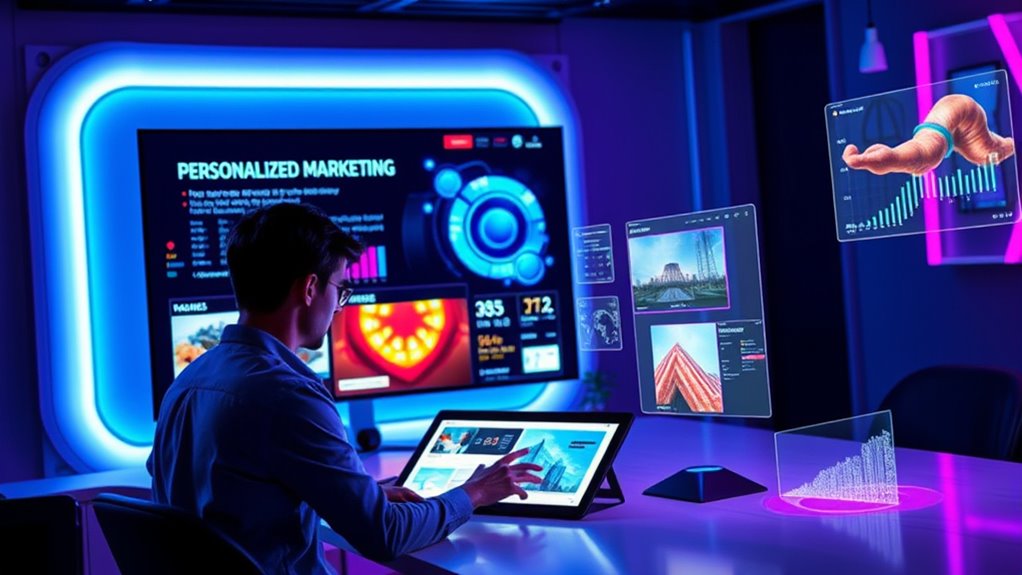Generative AI transforms your marketing efforts by enabling you to create highly personalized content quickly and at scale. It analyzes customer data, preferences, and behaviors to craft tailored messages across various formats like social posts, videos, and product descriptions. This not only boosts engagement but also saves you time by automating content creation, allowing your team to focus on strategy. Keep exploring to discover how you can leverage this powerful technology for your marketing success.
Key Takeaways
- Enables rapid, personalized content creation across multiple formats, enhancing marketing efficiency and reach.
- Analyzes customer data to generate tailored messages that resonate with individual preferences.
- Automates scalable content production, reducing manual effort and accelerating campaign deployment.
- Continuously learns from data to improve content relevance and engagement over time.
- Supports multi-channel consistency while allowing customization for diverse audience segments.

Have you ever wondered how brands create personalized content at scale so quickly? It’s a question many marketers ask as they seek ways to connect more deeply with their audiences without sacrificing efficiency. The secret lies in generative AI, a technology that enables the rapid creation of tailored content tailored to individual preferences. Instead of manually designing each message or piece of content, you can leverage AI algorithms that analyze data, understand customer behavior, and generate messages, images, or videos that resonate on a personal level. This transforms the way marketing teams operate, allowing for mass customization that was once impossible or prohibitively time-consuming.
Generative AI enables rapid, personalized content creation at scale, transforming marketing with efficiency and deep audience engagement.
Generative AI works by learning from vast datasets—like customer interactions, social media activity, purchase history, and more. As it trains, it recognizes patterns and nuances, enabling it to produce content that aligns with each user’s interests and needs. For example, if a customer regularly buys outdoor gear, the AI can generate personalized emails showcasing new hiking boots or camping equipment tailored to their preferences. The process is seamless and rapid; what once took days or weeks to craft can now be done in minutes, freeing up your team to focus on strategy and creative oversight.
This technology also excels at producing diverse content formats. Whether it’s customized product descriptions, social media posts, or video scripts, generative AI adapts across channels effortlessly. It ensures consistency in messaging while allowing for variations that appeal to different segments. You no longer need to create each piece from scratch, reducing workload and accelerating campaign deployment. This scalability means you can maintain personalized engagement even as your customer base grows, without sacrificing quality or relevance.
Moreover, generative AI continuously learns and improves. As more data flows in, the system refines its output, making the content more accurate and engaging over time. This dynamic learning process helps you stay ahead of trends and adjust messaging quickly, ensuring your marketing remains relevant in a rapidly shifting landscape. It also provides valuable insights into customer preferences, which can inform future campaigns and product development. Additionally, it can assist in breast cancer symptom detection, highlighting the potential for AI to have a positive impact in healthcare.
In essence, generative AI empowers you to deliver personalized experiences at a scale that was previously unthinkable. It bridges the gap between individual customer needs and mass marketing efforts, creating a more authentic connection. By embracing this technology, you can increase engagement, boost conversions, and build stronger relationships—all while streamlining your content creation process. It’s a game-changer, transforming marketing from a one-size-fits-all approach into a highly personalized, data-driven dialogue with every customer.
Frequently Asked Questions
How Does Generative AI Ensure Data Privacy in Marketing Campaigns?
Generative AI guarantees data privacy in marketing campaigns by using techniques like anonymization, encryption, and strict access controls. You’re protected because the AI processes only the necessary data without exposing sensitive information. Additionally, compliance with regulations like GDPR or CCPA guides how data is collected, stored, and used. This way, you can personalize content effectively while respecting consumer privacy and maintaining trust.
What Are the Limitations of Ai-Generated Content Accuracy?
Did you know that AI-generated content has an accuracy rate of around 80-85%? However, you should be aware that it can sometimes produce factually incorrect or outdated information, especially with complex topics. This means you can’t rely solely on AI for precise details. You need to review and fact-check the content to make certain it meets your standards, as AI still struggles with nuance and context in certain situations.
How Can Small Businesses Implement Generative AI Effectively?
You can implement generative AI effectively by starting small with clear goals, like automating simple content tasks. Choose user-friendly tools and invest time in learning their features. Regularly review AI outputs for quality, and adjust your prompts for better results. Collaborate with experts if needed, and focus on integrating AI seamlessly into your existing workflows. This approach helps you maximize benefits without overwhelming your resources.
What Are Ethical Considerations for Ai-Created Marketing Materials?
You should be mindful of transparency, clearly disclosing when content is AI-generated to build trust. Avoid misleading your audience, and respect privacy by not using personal data unethically. Guarantee your AI tools don’t perpetuate biases or stereotypes, which can harm your brand reputation. Regularly review generated content for accuracy and fairness, and stay informed about evolving regulations to stay compliant and ethical in your marketing efforts.
How Does Generative AI Adapt to Evolving Consumer Preferences?
You can depend on generative AI to adapt to evolving consumer preferences by continuously analyzing real-time data and feedback. It identifies emerging trends and shifting behaviors, then updates content dynamically to match these changes. This allows you to stay relevant and engaging without manual intervention. By leveraging machine learning, you guarantee your marketing messages resonate with your audience’s current interests, fostering stronger connections and improving overall campaign effectiveness.
Conclusion
Imagine creating thousands of personalized marketing messages in just minutes—it’s possible with generative AI. Did you know that 80% of consumers are more likely to buy from brands that offer personalized experiences? By harnessing this technology, you can scale your efforts and truly connect with your audience on a deeper level. Embrace generative AI today, and watch your marketing become more impactful, efficient, and tailored to each individual’s unique needs.










